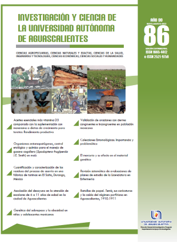Association of breakfast on the attention of school age children from 6 to 11 years old in the city of Aguascalientes
DOI:
https://doi.org/10.33064/iycuaa2022863625Keywords:
Breakfast, attention, school-age children, school performance, memory, food intakeAbstract
School breakfast should provide up to 25% of daily calories, when it is not consumed the correct fulfillment of school activities decreases. The effect of breakfast consumption on the attention of 383 school-age children from 6 to 11 years old in Aguascalientes City was analized. We apply memory and attention cognitive tests from the psycho-pedagogical battery EVALÚA as well as a dietary recall to assess the quantity and quality of the children's breakfast. The classification of memory and attention was found to be related to the number of total calories consumed at breakfast (p<0.05). Nevertheless, it was found that there is no correlation between both variables (Rho 0.085, p>0.05). No association was found between the type of breakfast and the classification of memory and attention (p>0.05). The type of breakfast does not present a relationship with the attention capability of school-age children.
Downloads
References
• Adolphus, K., Lawton, C., Champ, C. y Dye, L. (2016). The Effects of Breakfast and Breakfast Composition on Cognition in Children and Adolescents: A Systematic Review. Advances in Nutrition, 7 (3), 590S–612S. doi: 10.3945/an.115.010256
• Alegría, C. y Rozas, C. (2020). El Efecto De Los Desayunos Escolares Sobre Los Aprendizajes (Tesis de Licenciatura) Universidad del Pacífico, Perú. Recuperado de https://repositorio.up.edu.pe/handle/11354/2662?show=full
• Arvizú, O., Polo, E. y Shamah, T. (2015). Qué y cómo comemos los mexicanos. México, D.F.: Grafía Editores.
• Bernabéu, E. (2017). La atención y la memoria como claves del proceso de aprendizaje. Aplicaciones para el entorno escolar. ReiDoCrea, 6 (2), 16-23. Recuperado de https://www.ugr.es/~reidocrea/6-2-3.pdf
• Brandley, E. y Holton, K. (2020). Breakfast Positively Impacts Cognitive Function in College Students With and Without ADHD. American Journal of Health Promotion, 34 (6), 668-671. doi: 10.1177/0890117120903235
• Durán D y Valdebenito V. (2014). Desarrollo de la competencia lectora a través de la tutoría entre iguales como respuesta de la diversidad del alumnado. Revista Latinoamericana de Educación Inclusiva, 8 (2), 141-160. Recuperado de http://www.rinace.net/rlei/numeros/vol8-num2/art7.pdf
• González-Soto, CE., Jiménez-González, MJ. y Cárdenas-Rodríguez, ML. (2020). Escolares como promotores en salud alimenticia. Jóvenes en la Ciencia, 7, 1-4. Recuperado de http://www.jovenesenlaciencia.ugto.mx/index.php/jovenesenlaciencia/article/view/3207
• Grantham-McGregor, S. (2005). Can the Provision of Breakfast Benefit School Performance? Food and Nutrition Bulletin, 26 (2), S144–S158. doi: 10.1177/15648265050262S204
• Hoyland, A., Dye, L. y Lawton, C. (2009). A systematic review of the effect of breakfast on the cognitive performance of children and adolescents. Nutrition Research Reviews, 22 (2), 220-243. doi: 10.1017/S0954422409990175
• Iovino, I., Stuff, J., Yan, Liu., Brewton, C., Dovi, A., Kleinman, R. y Nicklas, T. (2016). Breakfast consumption has no effect on neuropsychological functioning in children: a repeated-measures clinical trial. The American Journal of Clinical Nutrition, 104 (3), 715-721. doi: 10.3945/ajcn.116.132043.
• Liu, J., Wu, L, Um, P., Wang, J., Kral, T.V.E., Hanlon, A., Shi, Z. (2021). Breakfast consumption habits at age 6 and cognitive ability at age 12: A longitudinal cohort study. Nutrients, 13 (6): 2080. doi: 10.3390/nu13062080. PMID: 34204553.
• Moreno, JM., Galiano, MJ. (2015). Alimentación del niño preescolar, escolar y del adolescente. Pediatría Integral, 19 (4), 268–276.
• Organización Mundial de la Salud. (2019). El papel de la escuela. Recuperado de https://www.who.int/dietphysicalactivity/childhood_schools/es/
• Organización Mundial de la Salud. (31 de agosto de 2018). Alimentación Sana. Recuperado de https://www.who.int/es/news-room/fact-sheets/detail/healthy-dieo.int/es/news-room/fact-sheets/detail/healthy-die
• Pérez Lizaur, A.B., Palacios González, B., Castro Becerra, A.L. (4ta Ed.). (2014). Sistema Mexicano de Alimentos Equivalentes. México: Cuadernos de nutrición (Fomento de nutrición y salud).
• Rampersaud, G., Pereira, M., Girard, B., Adams, J. y Metzl, J. (2005). Breakfast Habits, Nutritional Status, Body Weight, and Academic Performance in Children and Adolescents. Journal of theAmerican Dietetic Association, 105 (5), 743–60. doi: 10.1016/j.jada.2005.02.007
• Rubio, R., Bourges, H., Cervantes, LA., Chalte, A. y Tapia, KL. (2009). Alimentación recomendable - Diseños de Planes de Alimentación para el Escolar y Buenas Prácticas de Higiene. México D.F.: Secretaría de Educación Pública.
• Sampedro Fernández, C. (2016). La importancia de la alimentación en el desarrollo de las funciones cognitivas del niño. (Tesis de pregrado) Universidad de La Rioja, España.
• Secretaría de Salud. (27 de agosto de 2015). La importancia del desayuno. Gobierno de México. Recuperado de https://www.gob.mx/salud/articulos/la-importancia-del-desayuno
• Sistema Nacional para el Desarrollo Integral de la Familia. (2019). Lineamientos de la Estrategia Integral de Asistencia Social Alimentaria. Secretaria de Salud. Recuperado de http://sitios.dif.gob.mx/dgadc/wp-content/uploads/2018/12/Lineamientos-EIASA-2019.pdf
• Yanli, L., Jijun, Y., Wenye, L., Ru, C., Shike, Z. (2020). Eating Breakfast or Attending Extracurricular Tutoring, Which One is More Effective in Improving Student´s Performance? An Empirical Study based on the Data from A Large- Scale Provincial Survey. Science Insights Education Frontiers, 5 (1), 481-499. Recuperado de https://papers.ssrn.com/sol3/papers.cfm?abstract_id=3549432.
Downloads
Published
How to Cite
License
Copyright (c) 2022 Andrea Sánchez-González, Andrea Valeria Estudillo-Navarrete, Alejandra Gómez-Serna, Pamela Guadalupe Hernández-López, Luis Gerardo Ruiz-Sandoval, Diana Cristina Romo-Bueno, Ricardo Ernesto Ramírez-Orozco, Judith Martín del Campo-Cervantes

This work is licensed under a Creative Commons Attribution-NonCommercial-ShareAlike 4.0 International License.
Las obras publicadas en versión electrónica de la revista están bajo la licencia Creative Commons Atribución-NoComercial-CompartirIgual 4.0 Internacional (CC BY-NC-SA 4.0)









